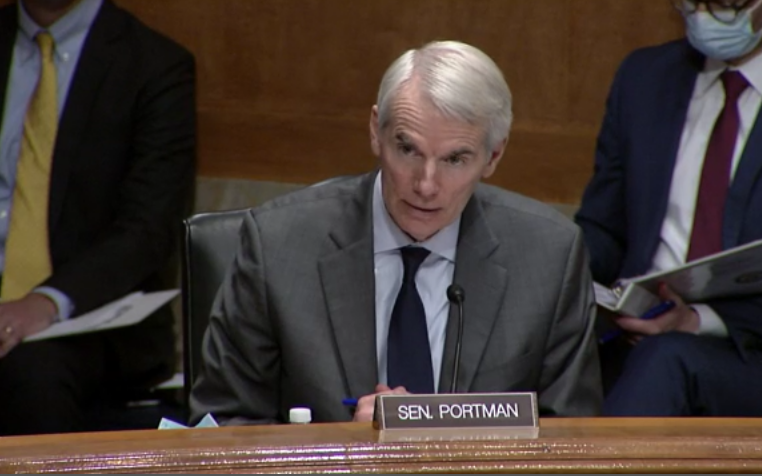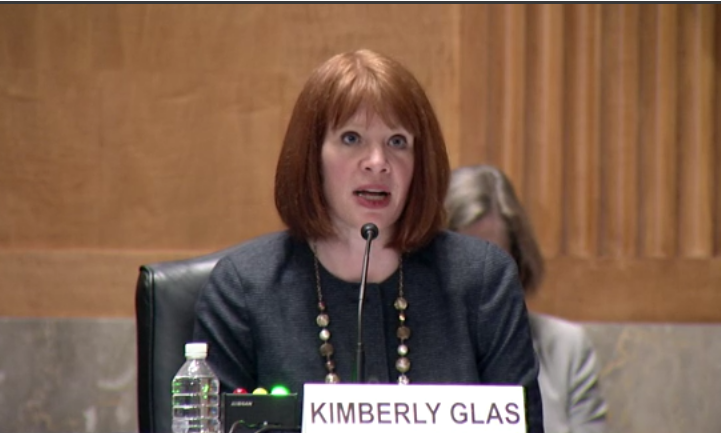At the beginning of the pandemic, March 2020, the Trump Administration phoned textile manufacturers and asked them to make masks and hospital gowns (PPE). They were desperate. With lockdowns imposed, demand for apparel textiles collapsed, so the industry was desperate for work. Textile companies made the investment and made the switch. A year later, China cranked up its volume on PPE. They’re now dumping it here, as is the China way. Now companies that spent money retooling to serve domestic demand for masks and gowns are – by and large — no longer getting orders. It’s all going to Asia, namely China.
“Over a period of time, the Chinese have invested significantly in fiber production, the essential raw materials that are used in PPE. They have continued to invest in this entire production chain actually, and it has been at our demise,” said Kimberly Glas, CEO of the National Council of Textile Organizations and an appointed commissioner for U.S. China Economic Security Review Commission.
During a Senate Homeland Security and Government Affairs Committee hearing on Wednesday, Glas said that two-thirds of our PPE is still coming from China. It’s increasing. “American producers have no orders because those orders are going to China again.”
For months, Congress has held hearing after hearing about reshoring critical supply chains. From face masks to generic drugs, studies have been done, committee hearings have been conducted over long three-hour sessions with nearly everyone on the same page: the U.S. is too reliant on China.
Sen. Rob Portman asked the four witnesses if they agreed; the U.S. was over-reliant on China for PPE and pharmaceutical inputs. All four said yes.
We have heard this now for nearly a year with some positive actions taken in the Trump years.

“Are we too over-reliant on China?” Answer: yes, yes, yes and yes.
“The U.S. government has already acted to engage a company called Phlow to make advanced pharmaceutical inputs (API) in the U.S. and they have engaged with a company called Civica as the buyer, but you need to encourage other Phlow-like companies to develop in the market-place as well,” said Stephen Schondelmeyer, one of the four witnesses from the College of Pharmacy, and the co-principal investigator of the Resilient Drug Supply Project at the University of Minnesota.
Both Schondelmeyer and Glas said textile companies and pharmaceutical producers like Phlow need long-term government contracts. Glas highlighted Canada’s contracts with local textile manufacturers to make PPE on contracts upwards of 10-years long. All of this makes it more secure for companies to invest.
On the drug side of the medical emergency supply chain, Schondelmeyer reminded the Senate Committee, led by Gary Peters (D-MI) that his project at U-Minn has tracked drug shortages for more than two decades. “We have had more than 170 drug shortages at every point in time. This current rate of drug shortages is unacceptable yet for some reason the market has been unable to deal with this,” he said, adding that “70% of the critical drugs highlighted by the FDA in the fall are still in short supply as of January 2021. That is simply unacceptable. The pharmaceutical market accounts for around 4% of the U.S. economy and yet we have no plan on how to move the domestic market forward. When Americans buy medication they might see an American brand on the label or its overseas subsidiary, but 80% of what’s in there likely came from outside the U.S. Most of the branded drugs come from Europe. Most of the generics come from India, with 70% of the key starting materials coming from China and 20% had no disclosed source for key starting materials.”
Sen. Ron Johnson (R-WI) said the U.S. needed to reshore more API and the key starting materials, a segment of the market China is keen on owning. But he was not open to strict Buy American provisions. He was also keen on letting the market correct for the supply chain blackholes in American critical medications.
“What about diversifying outside of China to other countries so we have some here, but some in other places, too? It’s not hard. The FDA can say, if you want to make this drug then this has to be made here up to a certain percent. But if people could make money on these drugs we wouldn’t have this problem, am I right?”
Schondelmeyer said relying on allies in times of need, when they need the same goods, is not the best way forward. “For the patient who needs the drug today, the market won’t solve that problem,” he said.
CPA supports long-term government contracts, like the kind Phlow has, to reshore generic drugs and build up an industry to produce medical gowns and masks. Right now, it looks like we are rolling back the clock to pre-spring 2020, where China ruled the roost on that supply. They’re staging a huge comeback. And Glas seems convinced they are dumping product.
 “A strong industrial base for the textile industry means a strong industrial base for PPE,” she said. “You need long-term federal government purchase orders, including in non-pandemic times. You need to deploy the Defense Production Act to reshore all PPE so there is no dumping of imports and counterfeit products coming to our shores. With the right regulatory framework, the PPE supply chain that was built up overnight can continue to grow.”
“A strong industrial base for the textile industry means a strong industrial base for PPE,” she said. “You need long-term federal government purchase orders, including in non-pandemic times. You need to deploy the Defense Production Act to reshore all PPE so there is no dumping of imports and counterfeit products coming to our shores. With the right regulatory framework, the PPE supply chain that was built up overnight can continue to grow.”
Should Congress not act on this, it will be an opportunity lost. Private hospitals and clinics may be a lost cause in the long run. They’re looking for price, sometimes at the expense of quality. But the very least, state-owned hospitals, the VA, and generic medications paid for by Medicaid should have strict Buy American contracts. That will keep more of the supply chain local and create jobs.
Many members of Congress are convinced this current pandemic is not over. Others believe a bigger one will come one day. If we weren’t prepared for this one, how we prepare for the next one is not only a literal matter of life and death, it is also a matter of national security.
Both houses of Congress and both parties, by and large, agree on the need to reshore critical supply chains. Action is required. As China builds out, something they can do quickly, the U.S. can easily return to the pre-pandemic days when it comes to medical supply chains. And in wanting to see the pandemic over and done with, may no longer feel the need to take action to make sure this never happens again.













